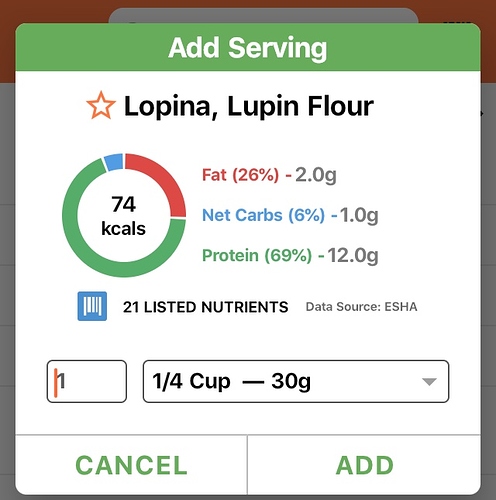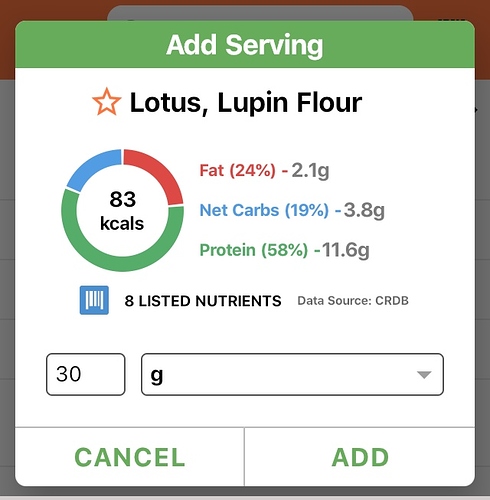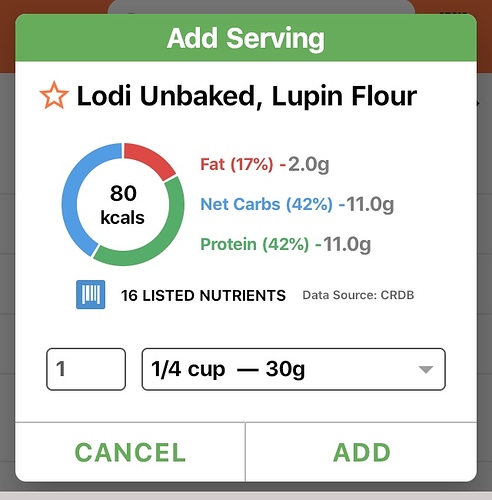I bet our early ancestors ate nuts and berries in season, as well.
'Good' Carbs?
I’m in maintenance, and to me the difference between “good” and “bad” carbs boils down to “if it is a whole food, with no ingredient label” it is an okay carb. I take a whole potato and bake French fries - that way I know what I’m getting. I don’t eat fruit, but if I did, I would consider it a healthy choice. Just nothing out of a bag or box. Avoiding added sugar is a priority for me at maintenance. The actual “carbs” may be metabolized the same way, but you’re still taking in added junk ingredients with processed foods.
Rereading my post I sound holier than thou. Truth be told I have enjoyed a slice every few days of 378 grain bread, but make myself read the label and remind myself about the molasses. The above advice is my goal. In other words, do as I say, not as I do!
,
Search for “Michael Eades” on YouTube. He’s given the lecture several times, and all the variants have interesting new facts in them.
The onset of agriculture is when you start seeing tooth decay in ancient man and I think that is what Tutankhamun the Egyptian pharaoh of the 18th dynasty died of (a tooth infection), at least seemingly? Pre-agriculture/pre-historic man; no cavities or dental caries? Or is it just an isolated anomaly in the archeological records? There seems to be some kind of connection between un-fermented grain and fermented grain and seeds but not un-fermented seeds?
In ancient time, I think they fermented the grain and seeds (common practice?) because it removes the phytic acid (the anti-nutrient) although they really didn’t know what that was at the time (maybe through some other type of scientific medium or paradigm?) and maybe that’s the difference between fermenting grain/seeds and not fermenting grain/seeds in contrast to dental health (at least from what I can distinguish?), I could be totally wrong but I’m seeing identifiable comprehensible patterns in this whole grain (no pun intended) agriculture thing? Perhaps fermenting grain and seed was a way to keep bacteria, fungus, mold, mildew and insects out of the food and the gut; preservation (shelf life)?
Unfermented grain + High Fructose Corn Syrup HFCS (besides causing a fatty pancreas and liver from lack of choline and time) seems to punch holes in the mucin gut lining also separating the tight junctions and through them also leading to auto-immunity diseases and associated disorders?
The Michael Eades video (thank you @PaulL) :
And for the folks who think: “Yes, but fiber…” (Thank you @CarlKeller)
My main takeaways:
- Carbohydrate is just another name for sugar.
- We get all the sugar we need from gluconeogenesis, we don’t need to eat it.
- There is no essential carbohydrate, we can thrive without quite well.
To the OP: there are no ‘good’ carbs, only bad and badder carbs.
How does a ketogenic diet actually work, ie how does 'eating fat burn fat'?
Don’t mind it at all! Ketosis by itself means nothing to me. I spent way too long caring about crap like that, wasting money on ketone strips, ketonix, constant testing and the only thing that it did was successfully make my wallet thinner. Having a good ketone level is meaningless when that’s all it is. Convinced myself for a long time that being as heavy as I was (almost 300) and pre-diabetic that I had to be more anal about stuff like that, that attitude striped me of a lot of muscle (because I became afraid of protein) and no matter how hard I pushed I couldn’t fix it. Being a lifter prior, I knew it wasn’t my effort. Since I started tweaking everything I enjoy all the positives of keto, and no longer have the downsides. I’m lifting heavier again, have more athletic stamina, and if I do test as long as I’m clear the couple hours surrounding workouts I still register the same ketones I always have.
@lfod14 I have never tested in a year of eating this way. I have never stressed on whether or not I was in ketosis. I just eat right and trust the process. I have no worries about excess protein, I just eat what feels right. I do track food but there can be quite a varied daily swing. Over time my macros are in line with what calculators say I need mostly, a bit high on protein but I don’t worry about protein being high up to a reasonable limit. I don’t really crave more carbohydrates than I eat which is usually between 15-20 occasionally up to 28 or so. I eat this way for health and medical challenges. This has resulted in -50 lbs and a great increase in my health markers.

Eggs per 100 grams: fat 9.51gr, protein 12.56gr, carbs 0.72gr source
Beef liver per 100 grams: fat 3.54gr, protein 20.35gr, carbs 3.54gr source
Pork liver per 100 grams: fat 3.65gr, protein 21.39, carbs 2.47gr source
Chicken liver per 100 grams: fat 4.46gr, protein 16.96, carbs 0.89gr source
As Mark noted, these are ‘incidental carbs’. Eggs and liver are not nutritious because of their carb content but rather in spite of it. These are not ‘good carbs’ but ‘free rider’ carbs. Paying a small ‘carb tax’ to eat otherwise nutritious food is not a problem, which is why staying sub-20 grams per day is a good rule of thumb.
The OP asked “…if I were to occasionally indulge in carbs (and fyi I’ve been on keto a year and am currently at maintenance), what would be the healthiest ones to eat?” He means make a predominantly carb meal. My answer remains: carbs are carbs, the only difference is how long they take to become glucose. The choice is between bad and badder, only because some have a less detrimental effect than others.
For me i use lupin flour for the occasional naan. Resistant starch is interesting. I use green bananna powder ocassionally for gut health. Ive read papers saying reheated white rice is lower in carbs because the starch becomes more resistant but hard to find net carb values.
This is an absolute myth, the difference is about 30 minutes before they convert to sugar. You might leach out some of the sugars by repeated boiling but why bother? Starches are unhealthy no matter how you look at it or try to hack them.
Lupin flour, I had heard about this and saw some in the store the other day, it was 11 carbs per quarter cup. I also saw claims as low as 1 carb but I cannot see how the variation could be so wide.
I will believe the higher carb claims. I decided to avoid it because it’s a legume product and expensive too. Not worth starting into eating that to me. 
Thanks for sharing vid on creating resistant starches. I hadn’t tried it but was interested.
I use the lotus lupin flour and haven’t been kicked out of ketosis. Its great for the occasional naan to mop up a good Indian curry. Its not that expensive give the small amount needed.
While carbs/fibers are not an essential nutrient, they can certainly be essential in functionally rebalancing the unnatural hormonal & gut imbalances and toxicities that come with growing up in industrial culture and vastly affect our brains and whole bodies.
Certain nuances have to be incorporated in order to get the overview. We have stone age nervous systems and a paleolithic hind brain, but obviously our GI tracts and glandular systems have been pretty messed up with bacterial imbalances, metabolic derangement, and toxins - in comparison to our ancestors!
The point about resistant starch is getting it to maintain its insoluble quality so it can reach the large intestine and be a prebiotic to feed the good bacteria, who feast on it and in turn multiply rapidly. They make high levels of butyrate which boosts ketosis! Feeding the good bacteria modest amounts of fiber/RS actually boosts butyrate for the brain way more than getting it through just eating butter as per Grace Liu and some evidence-based research out there.
I’ve experimented, and my n=1 is that my brain functionality and mental outlook is even better with fiber. Plus, having a few tblsp of ghee refried chilled basmati rice with my curry is delightful on a culinary level!
Slightly higher veg/fruit/RS carbs (meaning, once fat-adapted and non-IR, somewhere around 50g net minimum, varying per person - which is simply the pre-maintenance level of Atkins and Phinney/Westman/Volek and still ketogenic) are very beneficial in conditions of extra cortisol stress & thyroid/adrenal fatigue - common in midlife females and anyone with PTSD. In my experience, and from what I’ve read keto women writing about anecdoctally regarding this stressed population specifically - once 100% fat-adapted - keeping to a minimum of around 50g net grain-free or insoluble fiber carbs a day (best when spread over 2-3 meals rather than via OMAD), can help a lot of midlife women in a roundabout way with hormonal balancing due to the cortisol/thyroid thing, and the benefits of alklalinization & butyrate production that comes with plentiful veg/fruit fiber. Keto physician Anna Cabeca MD says its helpful for anyone with stress-related PTSD endocrine disruption - ie, with women and men of any age. (Interesting relevant sidenote: though we often associate PTSD/CPTSD with combat, that’s not actually the most common cause of it - it is also sourced in childhood abuse, bad accidents, obstetric violence, sexual assault, gun violence, etc. And the rates of PTSD/CPTSD in U.S. women are more than double what men experience).
Fibrous carbs are food for the good bacteria in the large intestine - bacteria which are often crashed out by processed foods and by antibiotics overuse throughout childhood & adolescent. Microbiologist Norm Robillard PhD - who is highly recommend by LCHF/keto physician Dr. Michael Eades - focuses on reducing gut fermentation & toxicity. He incorporates some resistant starch for some folks while also reducing certain high-fermentation producing fibers.
Grace Liu PhD (pharmacologist) specializes in helping people heal from bacterial imbalances from industrial culture (SIBO, small intestine bacterial overgrowth) and she also has experience working with endurance athletes as well as long-term carnivore-ketoers who had gut problems after 6-7 years. Her motto for building a durable warrior gut is all about the bacteria: weed, seed, and refeed - and prebiotics and probiotics are a part of it. She did a great talk on it: https://www.enduranceplanet.com/dr-grace-liu-how-to-build-a-warrior-gut-common-and-solvable-gut-issues-in-athletes-and-more/
I don’t know; Dr. Berry is pretty convincing.
And Prof. Bikman said in one lecture that the easiest way to remodel your gut bacteria is to fast, to kill them all off, and then start fresh. He might have been joking, but it still sounds like a good idea.
Some people will follow any justification they can to eat sugar and starch, even claiming it’s medically sound has some kind of healthy purpose denying their addiction completely. Many of the same people complain about being stalled or not progressing. Whatever… I couldn’t care less how others eat and abuse their bodies.
I couldn’t care less how others eat and abuse their bodies.
To my knowledge, neither Berry nor Bikman (nor all the other keto physicians like Atkins, Phinney, Westman, Volek, the Eades) address females as a specific group in depth, neither midlife females and folks with PTSD/haywire cortisol - as well as the the subgroup of athletes with gut dysbiosis. I do care about developing nuanced understanding of human health via LCHF/keto, and expanding the spectrum of research & resources - so I’ve made a habit of observing who’s addressing what and seeking experiential reports from those focused on the unique hormone balancing of midlife females and others with high cortisol.
It can be challenging to have substantive discourse online without sharing a nuanced familiarity with foundational LCHF/keto books that explore metabolic healing, case examples, and phased plans for sustainable eating (The Art & Science Of Low Carbohydrate Living, Protein Power, The New Atkins For A New You, The Obesity Code, and the only female-focused ones, Radical Metabolism and The Hormone Fix: Keto-Green are some of my faves). Context is everything - and I also think the reality of diversity within the humans doing LCHF/keto deserves continued acknowledgement and ongoing study of certain groups. The good carbs and good-carbs-cycling subject has very different impacts and implementations for different subgroups of ketoers - IR vs Non-IR, females vs. males, midlifers vs. teenagers, weight-lifters/high intensity trainers vs. sedentary, etc. Dietary healing may have different approaches for PTSD people vs. no-PTSD, those with gut dysbiosis and those without, etc.
For my own slow, but ongoing, recomposition success, I credit the nuanced self-healing hormone-balancing approaches of the pro-alkaline LCHF/keto women’s health advocate camp (Louise Gittleman PhD, Anna Cabeca MD, Christiane Northrup MD, Stephanie Greunke RD, Stephani Ruper, Amy Berger MS) and also some of the paleo-keto female writers (this article and its long comments thread by Gruenke touches on many of the female-specific angles on carbs). And, as a non-alcoholic, I also credit the wine-with-food research of Salvatore Lucia MD (for cortisol reduction and gastrin production), and the realistic approach of the Drs. Eades and others when it comes to gastronomy!
Specializations of keto for addressing cortisol are hopefully in process - Anna Cabeca MD certainly has her own personal experience and case studies to draw from, which compelled her to write her book (with rave reviews by functional/LCHF/keto people like Mark Hyman MD, Christiane Northrup MD, and David Perlmutter MD).
Good carbs as part of a well-formulated ketogenic way of eating can be a method for making it culturally and personally sustainable in the world at large and in our household community gatherings, special events, holidays, and cross-cultural potlucks… Westman/Phinney/Volek address this quite well in the New Atkins For A New You Book. Despite what some with food addictions might do with it - it’s not a mere ‘justification to eat just any sugar or starch’, it’s quite a culturally-sensitive, well-formulated, pleasurable sustaining way of living a well-satiated and neurologically enlivened ketogenic life. 
(Heck, the Drs. Eades in their classic book Protein Power reported on a client of theirs who fit his carb allowance in such a way that he ate one piece of his fave candy per day (17g carbs) - which was his one treat in his overall psychological life - it helped him stay the course and lose a ton of fat and sustain the recomp. Such a hit of sugar wouldn’t work for me, but for that guy it was a drop in the bucket so to speak).
I agree with @David_Stilley . Carbohydrate is just another name for sugar. Women don’t need to eat it any more than men. Like @PaulL I remain unconvinced. Claiming a useful function needs serious back up data.
To me it seems like arguing that your liver has the texture of a truck tire tread because you’ve been drinking all the wrong types of alcohol. Cheap beer, gin and tequila will do that to you, doncha know. You can fix your liver by adding a glass of Sardinian dry red wine to your main meal every day and maybe cut back on the beer and gin a bit.
To me the concept of treats is a psychological holdover from sugar addiction. It’s a tease keeping alive the sugar as a treat concept we grew up with as children. The blissful sugar high was replaced with the need to chase that feeling and we never get it back like the first childhood experience when we were rewarded with “treats”. Escalated sugar use created addiction and metabolic derangement for all of us.We needed sugar and carbs (same) to feel normal. The concept of food as treats is the second level of the carb battle. It’s reforming you brain to make intelligent food choices rather than constantly looking for a way to hack ketogenic eating to accommodate the old sugar tooth. It’s about learning to make correct food choices. It’s about breaking the chain that food as a reward. It is so stuck in so many people’s minds that eating disorders are affecting our whole world. After I joined the forum I saw someone made a post almost a year ago said,
“Stop treating yourself, you aren’t a dog.”
This makes total sense to me. 



